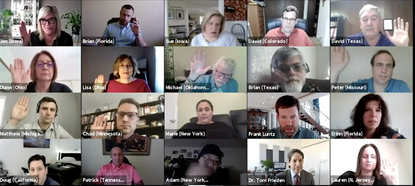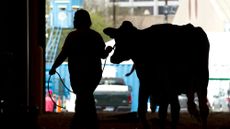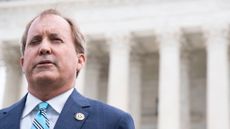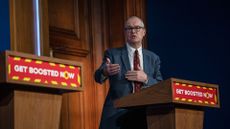Republicans are stubbornly hesitant to get a COVID-19 vaccine, and a Trump PSA might not help


Right now, demand for COVID-19 vaccines is outstripping supply but that will change in the coming weeks. Then the challenge will be to persuade people hesitant to get the vaccine to roll up their sleeves. And several recent surveys show that while vaccine hesitancy is falling overall in the U.S., "opposition among Republicans remains stubbornly strong," The Associated Press reports.
In a new AP-NORC survey, 42 percent of Republicans say they probably or definitely won't get vaccinated, versus 17 percent of Democrats. A recent NPR/PBS NewsHour Marist poll found that 49 percent of Republican men and 47 percent of Donald Trump supporters said they would opt out if a vaccine was offered to them, versus 6 percent of Democratic men. A CBS News-YouGov survey released Sunday recorded 33 percent of Republicans saying they would not get a shot and another 20 percent undecided.
Dr. Anthony Fauci, the nation's top infectious disease expert, told Fox News Sunday "it would make all the difference in the world" if Trump urged his supporters to get vaccinated, and longtime GOP pollster Frank Luntz told The Washington Post last week he didn't "need a focus group to tell me that nothing would have a greater impact than a Donald Trump PSA." He held a focus group of Trump supporters on Saturday, and it turns out Trump's endorsement wouldn't really move the needle.
Subscribe to The Week
Escape your echo chamber. Get the facts behind the news, plus analysis from multiple perspectives.

Sign up for The Week's Free Newsletters
From our morning news briefing to a weekly Good News Newsletter, get the best of The Week delivered directly to your inbox.
From our morning news briefing to a weekly Good News Newsletter, get the best of The Week delivered directly to your inbox.
Luntz's focus group heard pro-vaccine pitches from House Minority Leader Kevin McCarthy (R-Calif.) and other congressional Republicans, former CDC director Dr. Thomas Frieden, and former Gov. Chris Christie (R). The House Republicans made no inroads, and the participants were turned off by the PSA featuring every former president but Trump. Many of them didn't trust Fauci. But Frieden's "five facts" persuaded many of them to swing toward vaccination. "We want to be educated, not indoctrinated," said Adam from New York.
The participants said they were particularly swayed by Frieden's statements about the tens of thousands of people already vaccinated, the two decades of work on coronavirus vaccines — not just a year — and the near-unanimous willingness of doctors to get inoculated. They said their doctor or spouse could also persuade them, but politics was poison. By the end of the session, all 19 participants said they were more willing to get vaccinated.
"These people represent 30 million Americans, and without these people, you're not getting herd immunity," Luntz told the Post. He and other groups are testing differing messaging nationwide.
Create an account with the same email registered to your subscription to unlock access.
Sign up for Today's Best Articles in your inbox
A free daily email with the biggest news stories of the day – and the best features from TheWeek.com
Peter has worked as a news and culture writer and editor at The Week since the site's launch in 2008. He covers politics, world affairs, religion and cultural currents. His journalism career began as a copy editor at a financial newswire and has included editorial positions at The New York Times Magazine, Facts on File, and Oregon State University.
-
 'Good riddance to the televised presidential debate'
'Good riddance to the televised presidential debate'Instant Opinion Opinion, comment and editorials of the day
By Harold Maass, The Week US Published
-
 Caitlin Clark the No. 1 pick in bullish WNBA Draft
Caitlin Clark the No. 1 pick in bullish WNBA DraftSpeed Read As expected, she went to the Indiana Fever
By Peter Weber, The Week US Published
-
 Today's political cartoons - April 16, 2024
Today's political cartoons - April 16, 2024Cartoons Tuesday's cartoons - sleepyhead, little people, and more
By The Week US Published
-
 Texas dairy worker gets bird flu from infected cow
Texas dairy worker gets bird flu from infected cowSpeed Read The virus has been spreading among cattle in Texas, Kansas, Michigan and New Mexico
By Peter Weber, The Week US Published
-
 Dengue hits the Americas hard and early
Dengue hits the Americas hard and earlySpeed Read Puerto Rico has declared an epidemic as dengue cases surge
By Peter Weber, The Week US Published
-
 US bans final type of asbestos
US bans final type of asbestosSpeed Read Exposure to asbestos causes about 40,000 deaths in the U.S. each year
By Peter Weber, The Week US Published
-
 Seattle Children's Hospital sues Texas over 'sham' demand for transgender medical records
Seattle Children's Hospital sues Texas over 'sham' demand for transgender medical recordsSpeed Read Texas Attorney General Ken Paxton subpoenaed records of any Texan who received gender-affirming care at the Washington hospital
By Peter Weber, The Week US Published
-
 Afghanistan has a growing female suicide problem
Afghanistan has a growing female suicide problemSpeed Read The Taliban has steadily whittled away women's and girls' rights in Afghanistan over the past 2 years, prompting a surge in depression and suicide
By Peter Weber, The Week US Published
-
 US life expectancy rose in 2022 but not to pre-pandemic levels
US life expectancy rose in 2022 but not to pre-pandemic levelsSpeed Read Life expectancy is slowly crawling back up
By Devika Rao, The Week US Published
-
 Vallance diaries: Boris Johnson 'bamboozled' by Covid science
Vallance diaries: Boris Johnson 'bamboozled' by Covid scienceSpeed Read Then PM struggled to get his head around key terms and stats, chief scientific advisor claims
By The Week UK Published
-
 An increasing number of dog owners are 'vaccine hesitant' about rabies
An increasing number of dog owners are 'vaccine hesitant' about rabiesSpeed Read A new survey points to canine vaccine hesitancy
By Devika Rao, The Week US Published